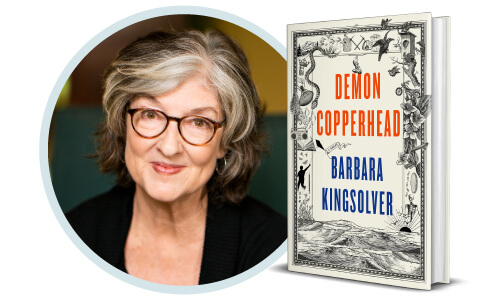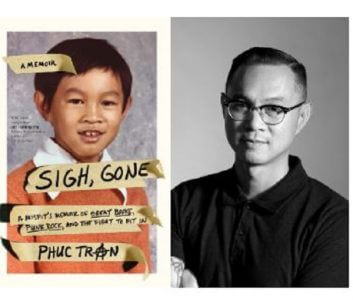Staying warm with Demon and Phuc
It is morning and the temperature is falling. According to my weather app it “feels like” negative 29 degrees, and yet as I look out my window, I see sun and blue sky. I took the dogs for a short walk earlier and, honestly, it wasn’t too bad — but they say it’s supposed to get colder before it warms up. A good time to have a reliable heating system and a few books on hand to pass the time.
I have a couple of good ones to recommend.
Top on my list is Barbara Kingsolver’s newest, Demon Copperhead. Named one of the “10 Best Books of 2022” by The Washington Post and The New York Times, it is a masterpiece. I am a fan generally of Kingsolver — I especially loved her collection of essays, High Tide in Tucson (1995), and novel, The Poisonwood Bible, about a missionary family who move from Georgia (USA) to a small village in the Belgian Congo (1998), but I have to say, this latest one takes the cake. I am listening to it on Audible, which I notice takes a lot longer than reading it, but it sure makes driving more interesting. (It is also very well read.)
 I am far from alone in my enthusiasm for this novel. It is an Oprah’s Book Club selection, as well as a New York Times, Wall Street Journal and Washington Post bestseller. Beth Macy, author of Dopesick, calls Demon “a voice for the ages — akin to Huck Finn or Holden Caulfield — only even more resilient.”
I am far from alone in my enthusiasm for this novel. It is an Oprah’s Book Club selection, as well as a New York Times, Wall Street Journal and Washington Post bestseller. Beth Macy, author of Dopesick, calls Demon “a voice for the ages — akin to Huck Finn or Holden Caulfield — only even more resilient.”
Inspired by Charles Dickens’ epic novel, David Copperfield (first published as a serial in 1849 and later as a book in 1850), Demon Copperhead takes on some of the 19th century novel’s themes, such as institutional poverty and its devastating effects on children, braiding them into a new context: the mountains of southern Appalachia — Lee County, Virginia, to be specific — where the narrator Demon (or Damon Fields, as he is officially named by his mother) is born to a strung-out but well-meaning teenage mom in a single-wide trailer. His father, we learn early on, drowned before he was born.
Demon’s story starts with his birth and takes us through his boyhood, his friendships, enemies, foster care, first love, football stardom, hope, disappointment, injury, pain … . It begins, “First, I got myself born. A decent crowd was on hand to watch, and they’ve always given me that much: the worst of the job was up to me, my mother being let’s just say out of it.”
There are dark and troubling themes here, the most pronounced being drug addiction and poverty, which run rampant in the lives of most of Demon’s community, along with abuse, negligence and neglect, yet the voice of Demon himself somehow holds steady and strong; warm, insuppressible and, even in the very lowest of times, humorous. One of Demon’s superpowers (besides, as it turns out, football) is a talent for drawing — specifically creating superheroes and comic strips. Over the course of the novel, one comes to feel that, despite his weaknesses, failings, misfortune and plain downright bad luck, Demon is himself a superhero. His wit, his lifeforce and his resilient spirit will stay with me for a long time. At least I hope they will. This book is a must read. Highly recommend.
Another book, which lay tucked in an embarrassingly tall stack in my bedroom for a long time before I finally picked it up and started reading it, is Sigh, Gone: A Misfit’s Memoir of Great Books, Punk Rock, and the Fight to Fit In by Phuc Tran. Did I read a review of this book at some point? Was I drawn to is cover? Honestly, I don’t remember. However it happened, I am so glad I read it.
Like Demon Copperhead, Phuc is an engaging and resilient narrator. He was a toddler in 1975 when he and his extended family fled the fall of Saigon. After spending time in a refugee camp, the Lutheran Church helped relocate his family to a small town in south-central Pennsylvania, where they basically stood out like sore thumbs in the all-American white community. Tran writes, “Random strangers had saved us. And random strangers were cruel to us, too.”
 Critics have called Tran’s writing “loose and rambling,” but I found his style to be companionable, fresh and refreshing. Gamboling might be a good word to describe it. The chapters are named after famous books, because one of the things that saves the narrator from loneliness and despair, besides skateboarding and punk rock, is: books.
Critics have called Tran’s writing “loose and rambling,” but I found his style to be companionable, fresh and refreshing. Gamboling might be a good word to describe it. The chapters are named after famous books, because one of the things that saves the narrator from loneliness and despair, besides skateboarding and punk rock, is: books.
At one point the author tells us how one day while working as a page at the local library, he came upon a discarded copy of Clifton Fadiman’s The Lifetime Reading Plan, which “listed and summarized all the books that (the author) thought educated, cultured Americans should read over their lifetime, beginning with the Bible and ending with Solzhenitsyn.” He bought it. “The Plan,” he writes, “would be the most powerful cannon in my war for assimilation.”
Phuc read what he could in no particular order: Flaubert, Twain, Kerouac, Bronte, Kafka, Thurber, Shakespeare …
“But in the course of reading great books, something happened,” he writes. “My reading molded me, the tool hammering its hand into shape. By some miracle — and by miracle, I mean great teachers — I pushed past the shallowness and stupidity of my own motivations. I fell in love with the actual literature and the actual ideas of great literature. As an immigrant, as a Vietnamese kid, as a poor kid, I had collected so many scarlet letters of alienation that I connected profoundly to the great works. … The snarl of my journey was untangled and laid out clearly by books.”
Author Sara Corbett comments that Sigh, Gone is “the great American nerd-punk boyhood memoir, a story that’s rollicking and laugh-out-loud funny while also offering a piercingly profound look at race, the challenges of assimilation, and the inherently defiant act of growing up. … I’ll follow this writer anywhere.”
I completely agree and couldn’t have said it better myself. And speaking of following this writer anywhere, I have never ever in my life had any desire for a tattoo, but I confess I am seriously thinking of getting one. Why? Because Phuc Tran runs a state-of-the-art tattoo parlor in Portland, Maine. Tsunami Tattoo, 583 Forest Avenue. If you read this book, let me know; you might want to join me on a road trip. Maybe we can get a twofer.
That’s enough for today. So many books, so little time. Please stay warm and maybe scan the internet for some plane tickets to someplace warmer. In the meantime, hand and toe warmers make a big difference. Along with a roaring fire and a good book. Bye for now.

